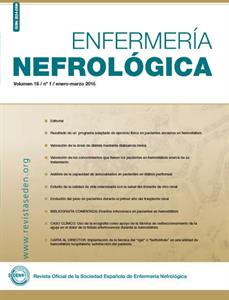Contenido del artículo principal
Resumen
Los diversos estudios que evalúan la calidad de vida relacionada con la salud (CVRS) de los donantes de vivo renales encuentran que es comparable a la de la población general, o superior, independientemente del tiempo desde del trasplante.
Objetivo: Evaluar la CVRS de los donantes de vivo renales y analizar aspectos relacionados con el proceso de la donación.
Material y Métodos: Se contactó telefónicamente con los donantes de trasplantes renales de vivo realizados hasta este momento en el Hospital Universitario Central de Asturias, y a los que quisieron participar se les auto-administró el Cuestionario de salud SF-36 versión 2.
A su vez se recogieron variables sobre la donación, sociodemográficas y clínicas.
Resultados: De los 29 donantes, 25 fueron mujeres (edad 52±11). Dos receptores perdieron el trasplante y un donante falleció. El 41% fueron cónyuges, el 28% madres, el 24% hermanos y el 7% cuñados de los receptores. La creatinina pre-trasplante fue 0,71±0,11 mg/dL y al alta 1,05±0,22 mg/dL. El 55% sufrieron algún efecto adverso siendo dolores abdominales y molestias en la herida los más habituales, y aunque no se encontraron diferencias estadísticas entre laparoscopia y lumbotomía, estos últimos tuvieron un ingreso más prolongado 7±2 vs 5±1 días (p=0,015). Las puntuaciones en el cuestionario de CVRS fueron similares a las de la población general en todas las dimensiones y el 100% volverían a donar.
Conclusiones: La CVRS de los donantes post-trasplante fue comparable a la población general. Por otro lado los donantes no se arrepienten de la decisión de donar independientemente de los efectos secundarios sufridos o los resultados del trasplante en el receptor.
Objetivo: Evaluar la CVRS de los donantes de vivo renales y analizar aspectos relacionados con el proceso de la donación.
Material y Métodos: Se contactó telefónicamente con los donantes de trasplantes renales de vivo realizados hasta este momento en el Hospital Universitario Central de Asturias, y a los que quisieron participar se les auto-administró el Cuestionario de salud SF-36 versión 2.
A su vez se recogieron variables sobre la donación, sociodemográficas y clínicas.
Resultados: De los 29 donantes, 25 fueron mujeres (edad 52±11). Dos receptores perdieron el trasplante y un donante falleció. El 41% fueron cónyuges, el 28% madres, el 24% hermanos y el 7% cuñados de los receptores. La creatinina pre-trasplante fue 0,71±0,11 mg/dL y al alta 1,05±0,22 mg/dL. El 55% sufrieron algún efecto adverso siendo dolores abdominales y molestias en la herida los más habituales, y aunque no se encontraron diferencias estadísticas entre laparoscopia y lumbotomía, estos últimos tuvieron un ingreso más prolongado 7±2 vs 5±1 días (p=0,015). Las puntuaciones en el cuestionario de CVRS fueron similares a las de la población general en todas las dimensiones y el 100% volverían a donar.
Conclusiones: La CVRS de los donantes post-trasplante fue comparable a la población general. Por otro lado los donantes no se arrepienten de la decisión de donar independientemente de los efectos secundarios sufridos o los resultados del trasplante en el receptor.
Palabras clave
calidad de vida relacionada con la salud; donante de vivo renal; trasplante renal de vivo.
Detalles del artículo
Licencia
Aviso de derechos de autor/a
© Los autores ceden de forma no exclusiva los derechos de explotación de los trabajos publicados y consiente en que su uso y distribución se realice con la Licencia Creative Commons Atribución - No comercial 4.0 Internacional (CC BY-NC 4.0). Puede consultar desde aquí la versión informativa y el texto legal de la licencia. Esta circunstancia ha de hacerse constar expresamente de esta forma cuando sea necesario.
Cómo citar
1.
Fernández-Viña Fernández AM, Valdés Arias C, Villar Fernández E, Díaz Corte C. Estudio de la calidad de vida relacionada con la salud del donante de vivo renal. Enferm Nefrol [Internet]. 2015 [consultado 18 Dic 2025];18(1):[aprox. 7 p.]. Disponible en: https://www.enfermerianefrologica.com/revista/article/view/4037




